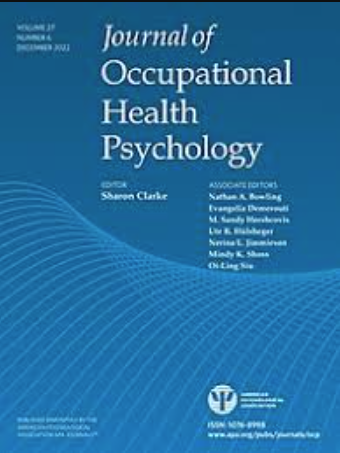经验不文明及其相关因素的荟萃分析:探索经验工作场所不文明的双路径模型。
IF 3.9
1区 心理学
Q1 PSYCHOLOGY, APPLIED
引用次数: 10
摘要
本研究使用经验不文明和频繁相关因素之间的元分析关系(k=246;N=145008),提出并检验了经验工作场所不文明的理论双轨模型。压力诱导的机制得到了感知压力的支持,感知压力介导了经历的不文明和职业健康(即情绪衰竭和身体抱怨)之间的元分析关系。承诺诱导机制也得到了对组织的情感承诺的支持,该承诺介导了经验不文明与组织相关性(即工作满意度和离职意向)之间的关系。然而,这些路径并不能解释经验丰富的工作场所不文明行为和实际发生的工作场所的不文明行为之间的强烈关系。适度分析显示,与主管的不文明行为相比,同事之间的经验制定联系更强;与同事相比,当主管实施不文明行为时,以及与混合职业样本相比,在人类服务样本中,经历过的不文明行为与组织相关性更强。我们讨论了理论和实践意义以及未来研究的方向。(PsycInfo数据库记录(c)2022 APA,保留所有权利)。本文章由计算机程序翻译,如有差异,请以英文原文为准。
A meta-analysis of experienced incivility and its correlates: Exploring the dual path model of experienced workplace incivility.
The present study proposes and examines a theoretical Dual Path Model of Experienced Workplace Incivility using meta-analytic relationships (k = 246; N = 145, 008) between experienced incivility and frequent correlates. The stress-induced mechanism was supported with perceived stress mediating the meta-analytical relationship between experienced incivility and occupational health (i.e., emotional exhaustion and somatic complaints). The commitment-induced mechanism was also supported with affective commitment to the organization mediating the relationship between experienced incivility and organizational correlates (i.e., job satisfaction and turnover intentions). However, these paths were not able to explain the strong relationship between experienced and enacted workplace incivility. Moderating analysis revealed that the experienced-enactment link is stronger between coworkers, in comparison to incivility experienced from supervisors; experienced incivility is more strongly related to organizational correlates, when incivility is enacted by supervisors in comparison to coworkers, and in human service samples when compared to samples comprised of mixed occupations. We discuss theoretical and practical implications as well as directions for future research. (PsycInfo Database Record (c) 2022 APA, all rights reserved).
求助全文
通过发布文献求助,成功后即可免费获取论文全文。
去求助
来源期刊
CiteScore
8.20
自引率
5.90%
发文量
46
期刊介绍:
Journal of Occupational Health Psychology offers research, theory, and public policy articles in occupational health psychology, an interdisciplinary field representing a broad range of backgrounds, interests, and specializations. Occupational health psychology concerns the application of psychology to improving the quality of work life and to protecting and promoting the safety, health, and well-being of workers. This journal focuses on the work environment, the individual, and the work-family interface.

 求助内容:
求助内容: 应助结果提醒方式:
应助结果提醒方式:


